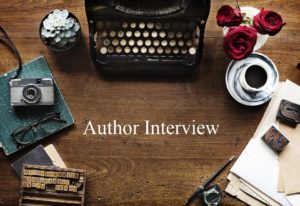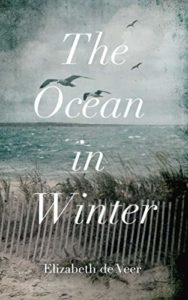An Interview with Elizabeth de Veer
 2021 Debuts author Elizabeth de Veer is the picture of perseverance. Like many authors, it took her a while to get to the point of publishing her debut novel. In fact, the subtitle of one of her blogs is “And how did I manage to stay with [writing] for 18 years before getting published?” I won’t spoil the surprise (you can read that post here), but note that if you want some tips for staying in the game, Elizabeth would be a good one to call on. All readers should be thrilled that Elizabeth decided to persevere, for her debut novel, The Ocean in Winter, is almost here (it releases July 6). And it’s quickly collecting praise. Kathleen Gilles Seidel that the book has an “exquisitely observed atmosphere with a page-turning plot,” and Jenna Blum said that she “cried for the last forty pages—from joy and gratitude.” Gratitude is something we can all use a little more of. Gratitude is something I have for Elizabeth for taking time out of her busy schedule to answer my questions.
2021 Debuts author Elizabeth de Veer is the picture of perseverance. Like many authors, it took her a while to get to the point of publishing her debut novel. In fact, the subtitle of one of her blogs is “And how did I manage to stay with [writing] for 18 years before getting published?” I won’t spoil the surprise (you can read that post here), but note that if you want some tips for staying in the game, Elizabeth would be a good one to call on. All readers should be thrilled that Elizabeth decided to persevere, for her debut novel, The Ocean in Winter, is almost here (it releases July 6). And it’s quickly collecting praise. Kathleen Gilles Seidel that the book has an “exquisitely observed atmosphere with a page-turning plot,” and Jenna Blum said that she “cried for the last forty pages—from joy and gratitude.” Gratitude is something we can all use a little more of. Gratitude is something I have for Elizabeth for taking time out of her busy schedule to answer my questions.
Christina: The Ocean in Winter is “An unforgettable story about grief, love, and what it means to be haunted” that was inspired by a trip to Smith Island, Maryland, and a memoir by Linda Grey Sexton. What inspired you to write this particular story as literary fiction as opposed to another genre?
Elizabeth: Good question! I think of literary fiction as a form that dives deep into character, setting and experience, and that’s just the way I write. This particular story could have been done as a more traditional mystery—and parts of it do come out that way—but I like to explore a situation’s emotional content, and the lives and relationships of the characters. I think those are the aspects that make this a literary novel more than a mystery.
Christina: The book features the three Emery sisters. Sisterhood can be magical, complex, and mystifying. What about sisters and sisterhood compelled you to write about them?
Elizabeth: In general, I think siblings are so interesting because (many times, but not all the time!) they were raised in the same house by the same people at the same time, and yet, they can have such a different experience or perspective on what occurred under that roof. And their reactions to the events can also be so diverse. In this case, when they are all children, each sister experiences the death of their mother very differently, simply because of the circumstances around her life at the time. And then, in adulthood, their individual reactions manifest in different ways, based on their experiences as children and also their personalities, the people they’ve grown up into. These three women really struggle with the desire to support one another while also itching to break away from the family to escape the pain and grief. So, I really enjoyed the chance to dig into how all of these pieces would play against each other, and what they would mean for the characters going forward.
Christina: Benjamin Rosenbaum, author of The Unraveling, said that the book is “thrilling, funny, and heartbreaking by turns” with characters who are “vivid and real.” How do you craft authentic characters? How do you balance the thrill with the humor and heartbreak?
Elizabeth: First of all, this blurb floors me every time, and I am so grateful for these kind words. For me, characters start with voice. Once I tap into that, everything else stems from there. Recently, I was working on a character and I wasn’t sure if she was a point-of-view character, but I thought I’d give her a chance at the microphone, and boy, she had a lot to say! (I had no idea!) I may know the basics of the circumstances of the character’s life, and the strengths and flaws, but voice is so unique and weaves all of the elements of character together, all the backstory pieces and the quirky details. When it’s done effectively, the hope is that the reader feels like they’ve met an authentic, red-blooded person.
Christina: What sort of research did you need to do for this book?
Elizabeth: I set this book mostly in Massachusetts towns that are very close to where I live, places where my family and I go regularly—the small, charming port town of Newburyport, the more rural, pastoral Newbury, Amesbury, which is a super fun town with a bit more bite to it, and Plum Island, at the coast, which provided the actual ocean. Much of the research I did was a matter of driving along the roads I was driving anyway, but trying to think about how to describe these places, and what I love about them. After that, there were several matters I needed to research. I had to learn how child protective services works, and I was unable to find someone to return my calls and emails, then I realized that a Facebook friend, someone I knew in college, was a social worker, and she gave me awesome info. When I needed to know how the police would handle a certain situation, I picked up the phone and called some New York City police department and said, “what would you do if …” and the man who answered the phone was very kind and patient and explained how things would unfold.
People of the world: when you take a moment to answer a writer’s questions, especially when they are personal, or when you are very busy, we are SO GRATEFUL!!! Thank you so much!
Christina: You also blog, and in a somewhat recent blog post you wrote, “I guess the truth of it is that the only way to get through grief is to grieve.” Grieving is different for different people, but writing can be a part of the grieving and healing process. Do you find writing to help with grief?
Elizabeth: You are absolutely right, writing can be a transformative part of the healing process. But for me, after having lost dear ones, I have to accept that there will be a period of time when I need to process the loss quietly. Journaling is a good way for me to get my raw feelings out, but time needs to pass before I can put together words that reflect any real understanding of the experience. This loss was really in its own category because it was totally unexpected. Afterward, I needed to think about it a lot, just the basic story, I needed to review what happened, and I had to ruminate on everything I knew about it. It was as if, for a few weeks, I needed to constantly remind or convince myself that it had happened at all, and that this person had died. I felt like I was re-organizing the landscape of people in my brain, like I was worried I might forget. But generally, I need to reflect for a while before I can use words to help me make sense of a loss.
Christina: How does your Master of Theological Studies inform your writing and your writing process?
Elizabeth: I’m not sure that my MTS informs my writing and/or writing process, but my interest in and love of writing stems from the same place as my interest in and love of studying religion. I truly believe that what connects all of us as humans is how important stories are to us. Story-telling is elemental to the human experience, and has been a part of our lives maybe since the beginning. We tell stories to work out who we are and who we want to be—as a culture, as a group, as individuals. We tell stories to think through the consequences of all of our actions, but we also tell stories to work through our emotions, and literature lets us weave it all together.
Christina: You once said, “At the end of the day, writers write.” If you weren’t a writer, what else could you envision yourself doing? What other creative pursuit do you practice?
Elizabeth: If I wasn’t writing, I’d have more time for reading! I would also make more time for exercise and laundry.
I turned in the final edits for The Ocean in Winter exactly one week before our area shut down for the pandemic and I had worked very hard on those for a few months, so I needed some time off before starting a new project. But then, it was that terrible, stressful time, and I did need a creative outlet. I started off trying to learn to doodle, and that was fun for a while, and then I got very into making altered books, where you find an old book and decorate the pages with collage and a variety of techniques. That was a ton of fun, but it really made a Giant Paper Mess in the living room, (some of which is still there) so I had to pull back from that. Finally, this past summer, I was able to start on a writing project that I’ve been thinking about for a couple of years, so that was the best.
I think if I wasn’t writing, I don’t think there’s another art form that I’d commit to with the same seriousness. But I do think my house would be a lot cleaner!
Please note that Elizabeth is doing a giveaway drawing and readers can sign up until June 30 (if you send a mailing address, she’ll send a postcard). Here’s the link for the form: https://www.
Elizabeth can be found in multiple places!
Website: http://www.elizabethdeveer.com
Instagram: @
Facebook: @elizabethdeveerauthor
Thanks to Elizabeth for agreeing to this interview! If you know of an author who’d like to be featured in an interview (or you are an author who would like to be featured), feel free to leave a comment or email me via my contact page.

